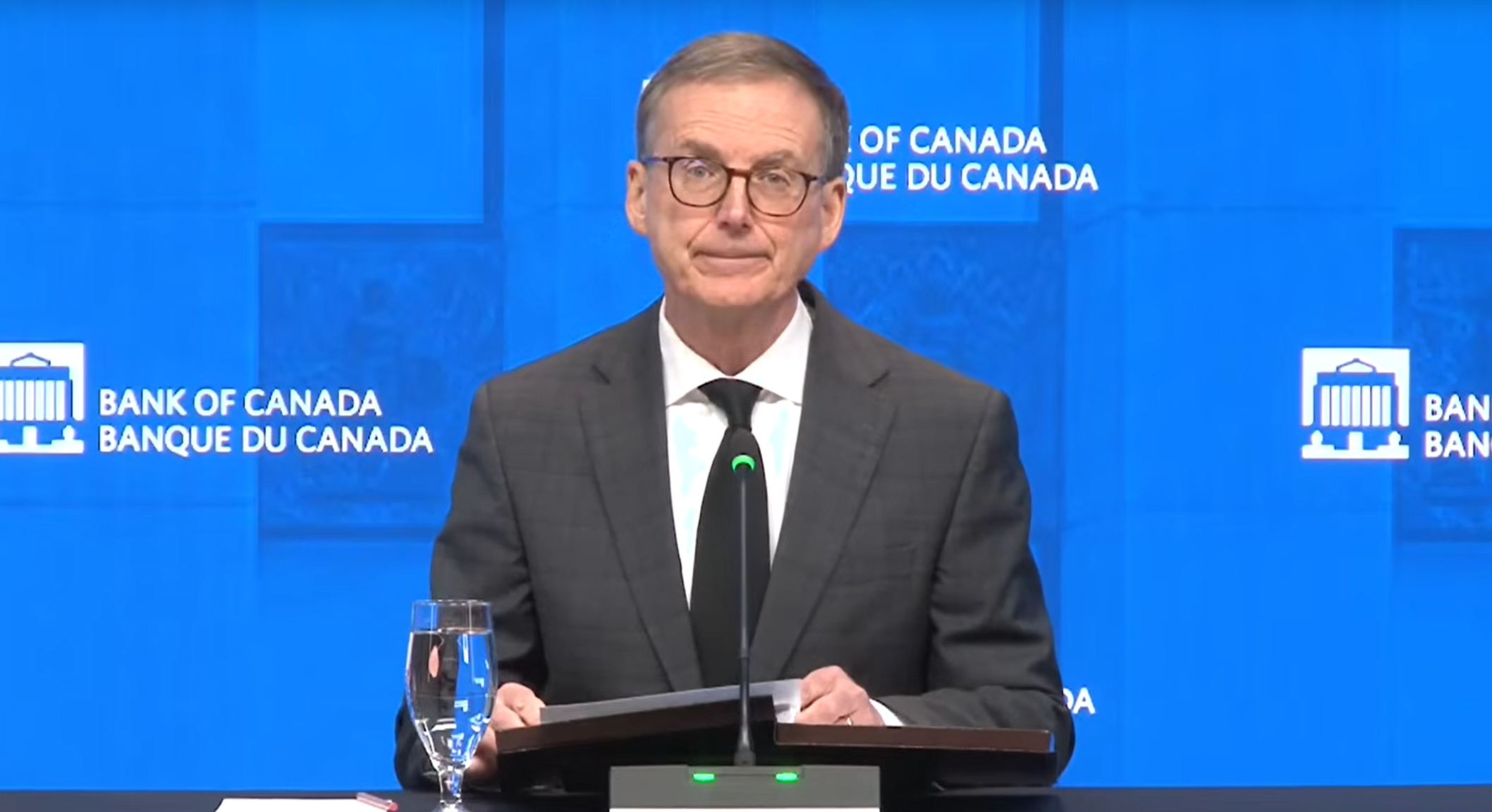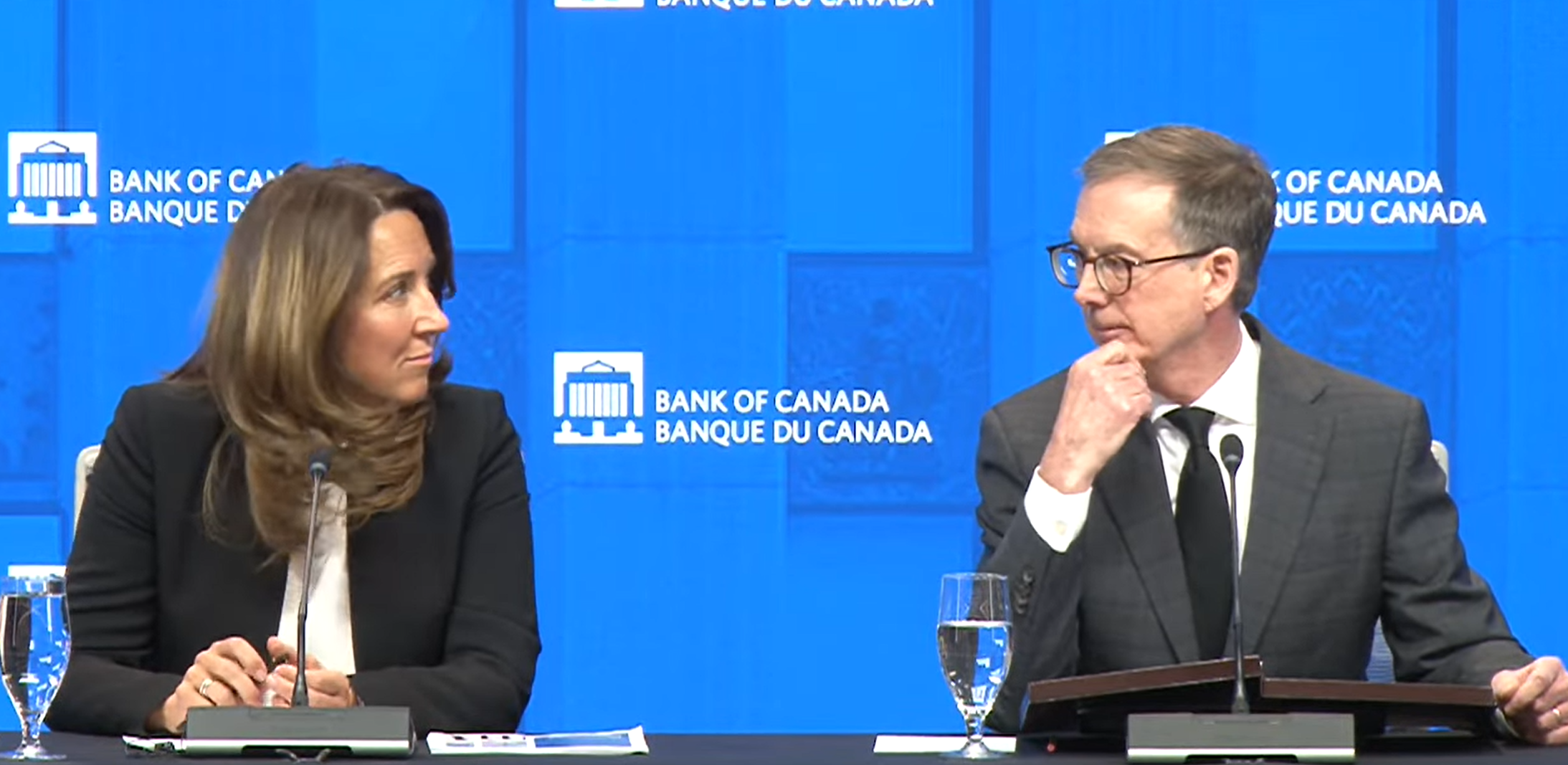Macklem: Bank of Canada has no economic magic wand
Bank of Canada Senior Deputy Governor Carolyn Rogers and Governor Tiff Macklem testified before the Senate Banking, Commerce and the Economy committee Nov. 6. / SCREENSHOT
Canada’s economy is on a “lower path” than it was before because of damage caused by U.S. trade measures, according to Bank of Canada Governor Tiff Macklem.
The Bank expects only modest growth through 2025, followed by a gradual pickup in 2026. “Even as economic growth recovers, the entire path for GDP is lower than it was before the shift in U.S. trade policy,” Macklem told the Senate Banking, Commerce and the Economy committee. “Monetary policy can help the economy adjust as long as inflation is well-controlled, but it cannot restore the economy to its pre-tariff path.”
Macklem’s testimony followed the Bank’s recent decision to lower its policy interest rate by 25 basis points to 2.25%, marking the second straight cut this year. Since January, the Bank has reduced rates by a full percentage point in response to what Macklem described as “ongoing weakness in the economy and contained inflationary pressures.”
Macklem painted a stark picture of the toll U.S. trade policy has taken on the Canadian economy, citing sharp contractions in key export sectors. “Canada’s GDP contracted 1.6% in the second quarter as tariffs and uncertainty reduced exports and business investment,” he said. “U.S. trade actions are having severe effects on targeted sectors including autos, steel, aluminum and lumber.”
Brace for friction
Pressed by senators on whether the Bank was equipped to manage further shocks from potential U.S. Supreme Court rulings on tariff authority, Macklem said Canada will need to brace for a prolonged period of trade friction. “Regardless of the Supreme Court ruling, I expect we’re going to be dealing with it for some time,” he said.
He reiterated that if U.S. tariffs escalate, it would “materially” impact the economy, making it “substantially weaker.”
Despite the slowdown, inflation remains near the Bank’s 2% target. CPI inflation was 2.4% in September, while core measures have been “sticky around 3%.” Macklem said the Bank expects inflation to ease over the coming months, adding: “We see the current policy rate at about the right level to keep inflation close to 2% while helping the economy through this period of structural adjustment.”
Labour market conditions have softened, with unemployment steady at 7.1% and wage growth slowing. “Wage growth has come down considerably,” Macklem told senators. “We do not see wage pressures as a big cost driver for companies.”
He acknowledged, however, that firms continue to face rising costs from reconfiguring trade and supply chains. “Companies are finding it difficult to pass on those costs,” he said.
Good projects
Beyond the immediate trade impacts, Macklem pointed to deeper competitiveness issues. Responding to Senator Colin Deacon’s questions on business investment, he said the Bank’s latest projections did not yet reflect federal “super deduction” incentives announced in Budget 2025 intended to spur capital spending.
“The super deduction lowers the cost of investment for businesses and should encourage more investment,” Macklem said. “Of course, there’s more to an investment than tax. You’ve got to have a good project and an expectation of profit.”
Macklem said the Bank would assess the uptake of such measures in its January 2026 projection, but emphasized that private-sector response remains critical: “It’s private businesses that are going to actually do these investments, and that’s something to be determined.”
Senior Deputy Governor Carolyn Rogers discussed the Bank’s expanding regulatory responsibilities under new federal legislation, including oversight of payment systems, stablecoins and open banking. She said the goal is to minimize overlap and burden for fintech entrants.
“One of the conversations we’ll be having over the coming months is how to make sure we don’t end up having three different registration regimes for those businesses,” Rogers said. “We’ve built a technology platform that should help us be efficient both for ourselves and for businesses that want to register under multiple regimes.”
Senator Deacon called the move “refreshing,” noting that “this has not been the way we’ve tended to operate in the past.”





